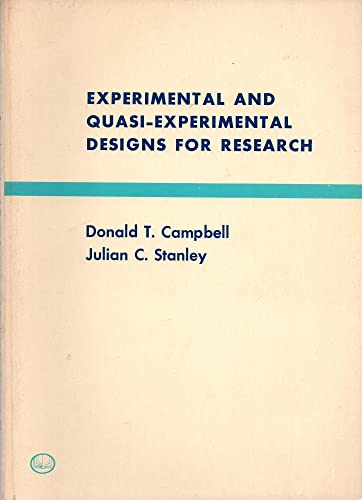Experimental and Quasi-Experimental Designs for Research
Donald T. Campbell; Julian Stanley
BOOK REVIEW

In the realm of research and statistical analysis, few works have left a lasting impact like Experimental and Quasi-Experimental Designs for Research by the formidable duo Donald T. Campbell and Julian Stanley. This groundbreaking text doesn't just skim the surface of experimental methods; it dives deep into the philosophical and practical intricacies of designing research that strives for validity and reliability. 🚀
From the moment you open this book, a world of rigorous inquiry unfurls. The authors, titans in the field, challenge you to reconsider what you think you know about experimentation. Their insights compel you to dissect not just the 'how' but the profound 'why' behind research designs. In a time when the noise of conflicting information often drowns out meaningful discourse, Campbell and Stanley's clarity and precision shine like a lighthouse in the fog. 🌟
This text isn't merely an academic exercise; it is a cerebral journey. With a focus on both experimental and quasi-experimental methodologies, the authors equip you with tools that empower you to navigate the treacherous waters of research design. You don't just learn; you begin to see the world through a discerning lens, where every variable matters and every choice counts. It opens a dialogue between experimental validity and practical applicability, demanding that you not only contemplate your research goals but also to confront the ethical implications of your methods.
What distinguishes this work is its unwavering commitment to fostering a robust understanding of statistical principles grounded in real-world application. You'll be confronted with scenarios that challenge your preconceived notions. There is an electric thrill in grappling with the nuances of randomization versus control groups, and in the effective delineation between correlation and causation. These are not just theories; they are the scaffoldings of enlightenment that can influence policy, education, and the very fabric of social science research!
Yet, with all its rigor, the text is often met with mixed reactions. Some readers find the depth of discussion daunting, questioning the accessibility for newcomers to the field. On platforms like Goodreads, critiques surface-some say it reads more like a manual than an inspiring guide, while others hail it as a cornerstone of research methodology. It's clear this work polarizes: where some see impenetrable jargon, others see a treasure trove of scholarly insight. The debates around its use in classrooms and research circles fuel discussions about the role of educational resources in shaping critical thinking skills in the social sciences.
Campbell and Stanley have etched their names into research history, influencing an entire generation of methodologists to carry the torch of rigorous inquiry. Their work has rippled through the fabric of academia and beyond. Influential figures like Edward L. Deci and Richard J. Murnane cite Campbell's principles as foundational to their own research-a testament to the enduring legacy of this seminal text.
As you delve into this book, you are not just a passive reader. You are thrust into a vibrant conversation about the nature of truth in research. 🧠💡 It's more than just a manual; it's a clarion call for integrity in the pursuit of knowledge. You emerge not only equipped to conduct more accurate and ethical research but also inspired to challenge the status quo of how research is perceived and executed across disciplines.
In the face of contemporary issues-be it in nursing, psychology, education, or social justice-this text urges you to reflect on the power of effective design. It compels you to ask: Are we merely collecting data, or are we relentlessly pursuing the truth? Are we contributing to the global discourse, or are we drowning in sound bites that masquerade as research?
Experimental and Quasi-Experimental Designs for Research is your entry point into a world where integrity and rigor reign supreme. This book not only reshapes your approach to research but also binds you to a community of thinkers eager to elevate the discourse of social science in a rapidly evolving world. Don't just read it-embrace it. Let it provoke thought, stimulate conversation, and inspire action. The stakes are high, and in this arena, knowledge isn't just power; it's the foundation upon which future generations will build their understanding of the world. 🌍✨️
📖 Experimental and Quasi-Experimental Designs for Research
✍ by Donald T. Campbell; Julian Stanley
🧾 84 pages
1963
#experimental #quasi #experimental #designs #research #donald #campbell #DonaldTCampbell #julian #stanley #JulianStanley